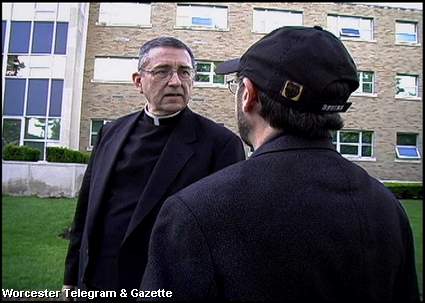Priest Abuse Eyed in 'Hand of God'
By Richard Duckett
Telegram & Gazette [Worcester MA]
November 10, 2006
http://www.telegram.com/apps/pbcs.dll/article?AID=/20061110/NEWS/611100338/1102/RSS01&source=rss
The Rev. Joseph Birmingham that Joe Cultrera remembers seemed a robust, amiable sort of person.
Years later, in the knowledge now of what happened to his older brother, Paul, Cultrera has had to recast those memories.
 |
| Joe Cultrera confronts Bishop Richard Lennon, Then of the Boston Archdiocese, in a Scene from the Documentary, " Hand of God." |
"Hand of God" has been picking up praise on the film festival circuit since the beginning of the year.
At the St. James School in Salem when Joe Cultrera was a young student, the priest would often stop into the classroom for no apparent reason.
"I look back now and remember things. He would come into classrooms and joke. He was very physical. He would hug kids. Now I look back — what was this all about?" Cultrera said.
His brother has far more frightening reasons to remember Birmingham. Paul Cultrera was repeatedly sexually abused by Birmingham in the mid-1960s .
It wasn't until nearly 30 years later that Paul broke his silence and told his brother. It turned out that other people also had horrific recollections of Birmingham, who was apparently moved from church to church by Boston Roman Catholic archdiocese officials.
Joe Cultrera traces his brother's story and the attempt to make Roman Catholic representatives face up to what happened in the documentary "Hand of God," which will have two screenings in Worcester this weekend.
"Hand of God" will be shown at 7 p.m. Friday in Unitarian Universalist Church, 90 Holden St., Worcester, and Joe Cultrera will be present for a question-and-answer session. The film also will be shown at 6 p.m. Saturday in Razzo Hall, Clark University, as part of the MassBay Film Festival.
Meanwhile, Bishop Robert J. McManus of the Roman Catholic Worcester Diocese has sent best wishes to Joe Cultrera on the local showings and said he hopes the film will aid in healing and forgiveness.
"Hand of God" has been picking up praise on the film festival circuit since the beginning of the year, and is scheduled to be shown as part of the PBS series "Frontline" in February.
Joe Cultrera is a filmmaker, so film seemed to him the obvious way to convey his brother's ordeal after learning the truth and wanting to help.
"I talked to him about possibly doing something. He wasn't like, 'Hey, what a good idea.' He took some time. He said he wouldn't do it with anyone else," Joe Cultrera said during a telephone interview from New York City, where he now lives.
But "Hand of God" is not a conventional exposé, per se, although there are confrontational sequences. Cultrera's often impressionistic style is what he has called "an interpretive dance." Family recollections and old homemade films are interspersed with interviews and contemporary footage that includes the final Mass at St. Mary's Church in Salem, a church closing that Cultrera sees as another ecclesiastical betrayal of a devoted Catholic community.
The film also is not without some humor, and the Italian-American Cultrera family stands engagingly together and strong — including Paul.
"I wanted to show that you can triumph over it," Joe Cultrera said. "A lot of the films (like this) are done trying to get parents to cry. Our film isn't like that. It's a strong family unit."
Cultrera said he was not abused and had no idea that his brother had been. After Birmingham left the parish, "there was some rumor" about the priest's behavior, but Cultrera didn't really think about it.
Birmingham died in the mid-1980s. Paul Cultrera began to speak out in 1992 — a good decade before the clergy abuse scandal made headlines. At the Boston archdiocese he dealt with the Rev. John B. McCormack (a seminary classmate of Birmingham) and became convinced that McCormack was covering certain matters up.
McCormack is now the Bishop of Manchester, N.H. In the documentary, Joe Cultrera is shown telephoning McCormack requesting a filmed interview. McCormack declines, but says he is willing to meet with people on a one-to-one basis to discuss their issues.
Paul Cultrera received a $60,000 settlement from the Boston archdiocese. A continued bitterness and disillusionment with the archdiocese is clear both among the Cultrera family (although Paul and Joe's parents still attend Mass) and in the film itself. That said, Paul Cultrera has lived in California for several years and is "doing remarkably well," his brother noted. "I think it's because he worked through it 10 years before a lot of others (victims)."
Asked about the sort of reaction his film has been receiving, Joe Cultrera said, "It's been real good. This type of film attracts people who are open to dealing with this issue. … It's a film that has helped a lot of people." Conservative Catholics and clergy have been tending to stay away, he added.
He said he sends e-mail to Catholic officials in a given diocese where the film is being shown for the first time.
Bishop McManus responded.
In his letter to Cultrera, Bishop McManus said, "I hope and pray that your documentary will help in the process of healing and forgiveness that are so needed for all involved in the horrific experience of child abuse. With God's grace and the determination of all who have been touched by this tragedy, let us commit ourselves to the firm resolution that such betrayal of trust and the profound hurt that resulted from it will not be dealt with in the present and in the future as it was in the past."
Cultrera said that Bishop McManus indicated that he would not be able to attend the Worcester screenings because of prior commitments.
However, "I'm kind of surprised that he e-mailed back," Cultrera said. "At least he's gone that step, I suppose."
Any original material on these pages is copyright © BishopAccountability.org 2004. Reproduce freely with attribution.